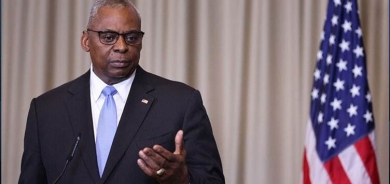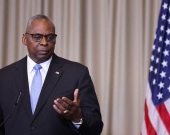Western powers draft new U.N. Security Council statement on Syria

The decision to prepare a “presidential statement” for the 15-nation council comes after Russia and China twice vetoed resolutions that would have condemned Syria’s yearlong assault on demonstrators opposed to President Bashar al-Assad that the United Nations says has killed well over 8,000 civilians.
“The French delegation circulated around a draft (statement) on Syria offering the council’s full support for the mission of the joint special envoy Kofi Annan,” Britain’s U.N. Ambassador Mark Lyall Grant, Security Council president this month, told reporters after a closed-door meeting on unrelated matters.
The draft statement, seen by Reuters, would have the council voice its “gravest concern at the deteriorating situation in Syria” and declare that it “fully supports (Annan’s) six-point plan” that calls for a ceasefire, political dialogue and full access for humanitarian agencies.
Lyall Grant said that he hoped the statement would be adopted on Tuesday. He added that Russia submitted to the council for approval a draft of informal remarks to the press that would have the Security Council condemn bomb attacks in the Syrian cities of Damascus and Aleppo at the weekend.
“Kofi Annan asked for support from the council,” French Ambassador Gerard Araud said. “He wanted to show that all the council is behind him. And that’s the point of the (presidential statement), only Kofi Annan.”
Araud said that council members would most likely want to consult their capitals on the draft presidential statement before approval. It was not clear whether Russia and China would oppose some elements of the statement.
German Ambassador Peter Wittig said the statement would send a double message that “strengthens his (Annan’s) hand and strengthens the council support for Kofi Annan.”
“Number two, it is a clear message to the Syrian authorities to cooperate with Kofi Annan, to cooperate with the Security Council and, above all, to end the violence that is still raging in a very brutal way as we speak,” he told reporters.
Negotiations stalled
Western diplomats said privately that their push for a statement backing Annan highlighted their determination to break the impasse on the Security Council that has prevented it from taking any forceful action against Syria since Assad began cracking down on demonstrators a year ago.
Annan, the U.N.’s previous secretary-general, on Friday urged the Security Council to overcome its deadlock and unify in support of his efforts to end the violence, which has brought Syria to the brink of civil war, council diplomats said.
Addressing a closed-door meeting of the 15-nation council via video link, Annan said the tougher the council’s message in support of his efforts to negotiate a ceasefire and launch political dialogue between the government and opposition, the greater his chances of ending the fighting, envoys said.
Unlike resolutions, which are legally binding and need nine votes in favor and no vetoes from the five permanent council members to pass, statements are generally non-binding but require unanimous support from the council.
The latest draft presidential statement, which is supported by France, Britain, Germany, Portugal and the United States, is separate from a U.S.-drafted resolution calling on Syria to allow access to humanitarian aid workers in the country.
Negotiations on the U.S. draft have stalled while Annan works to persuade Assad and the Syrian opposition to agree to a ceasefire, diplomats said. Russia and China say the West and Gulf Arabs seek Libya-style regime change in Syria, which Moscow and Beijing oppose.
However the U.S. said it has noticed “an evolution” in Russia's position towards ending the bloodshed in Syria.
State Department spokeswoman Victoria Nuland told reporters that she noticed “an evolution in the Russian public position” on Syria, saying recent comments by Moscow were “good steps.”
Russia, a key ally of Syrian President Bashar al-Assad, called on Damascus Monday to immediately accept demands by the International Committee for the Red Cross for a daily two-hour humanitarian truce to allow access to the wounded.
The crucial backing from Moscow to exert stronger pressure on its Soviet-era ally came after ICRC President Jakob Kellenberger huddled with Foreign Minister Sergei Lavrov for about 90 minutes in Moscow.
“The two parties call for the Syrian government and armed groups to immediately agree to a daily humanitarian truce to allow the ICRC access to the wounded and to civilians who need to be evacuated,” a Russian foreign ministry statement said.
Russians have said on Assad “that they don't support him, that they do want to see a humanitarian ceasefire, that they do want to see a political process,” Nuland commented. “So those are all good steps.”
The last time the council passed a presidential statement on Syria was August 2011, although council members reached a rare unanimous agreement on informal remarks to the press on March 1 to rebuke Damascus for not allowing U.N. humanitarian aid chief Valerie Amos into the country.
Shortly after the council approved those remarks to the press, Amos was allowed to visit Damascus.
(Reuters)














